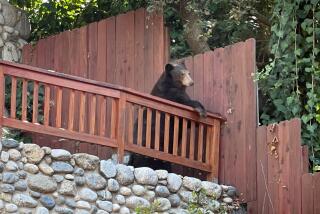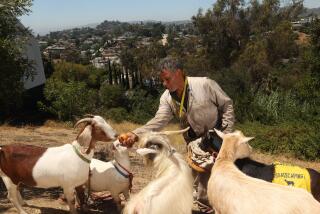Warden Hunts the Hunters
âFishermen will look you right in the face and lie to You.â
--Game Warden Ken Walton
Heâs a bush policeman, guardian of deer and fish, the guy who writes tickets to fishermen who catch more than the legal limit.
Ken Walton, game warden, cop of the Angeles National Forest, finds hunters in the brush despite their camouflage and checks their licenses and tags. He keeps tabs on their movements and knows where to find their prey. In a sense, he hunts the hunters, and sometimes must hunt the most elusive prey of all--poachers.
âThere might be 13 hunters out in the field, and theyâve all got rifles,â Walton said. âMaybe itâs just you by yourself or maybe youâve got another warden, if youâre lucky. But itâs nice. It sure beats the office, man.â
A Chain-Smoker
Walton, a chain-smoker from Brooklyn, packs a pistol and wears sneakers. His territory in northern Los Angeles County is the rugged southern slopes of the San Gabriel Mountains--roughly 20 square miles, he said--and he usually handles it alone; two other wardens are responsible for the northern slopes. He puts in long and irregular hours, sometimes working at night to catch âspotlighters,â hunters who illegally use flashlights to surprise and disorient deer before shooting them.
Walton has spent most of this year stalking poachers and monitoring the activities of fishermen and, more recently, archers, who were permitted to hunt deer from Sept. 7 through today.
Deer shooting season begins Saturday and runs through Nov. 3. Itâs the busiest time of the year for both Walton and the poachers.
The 35-year-old Waltonâs day typically begins at 7 a.m. with some rock ânâ roll on his truck radio and a lot of coffee. Then he charges up the San Gabriel Mountains in his four-wheel drive, winding through an intricate network of dirt roads and searching, waiting and watching.
Walton said he has never felt physically threatened by hunters and has never had to draw his gun.
âWith hunters, when you catch them doing something wrong itâs usually a âYou got meâ type of thing,â he said. âFishermen will look you right in the face and lie to you.â
But even among game wardens, there is talk of the one that got away. âEvery warden has somebody in their district doing something wrong,â Walton said.
âBut you canât catch him because heâs slick or lucky or whatever.â
On a recent Saturday, Walton checked the papers of six archers hunting deer and found them in order. But the sound of gunshots nearby worried him. Shooting deer out of season is a crime punishable by a $500 fine or six months in jail.
Walton spent the next hour moving from spot to spot in his truck, pausing for long intervals at high vantage points, combing the hot, scrubby distances with binoculars or simply searching ravines and slopes crowded with vegetation.
âYour eye gets trained to pick out movement, whatâs not natural,â Walton said.
Despite an exhaustive reconnaissance of the hillsides, however, Walton could not find the source of the gunfire.
Some poaching, he said, is merely the work of overeager sportsmen trying to get a jump on the deer season. These are the hunters who shoot deer during bow season or kill more than the single deer allowed by the state. Walton monitors the hunters by looking for the a tag that is supposed to be attached to animal after it is killed.
But far more common, Walton said, are those who poach for a living, contributing to a multimillion-dollar illegal industry statewide.
In 1983, the most recent year for which figures are available, the state collected $41.8 million in revenue from both commercial and private hunting and fishing interests. State Fish and Game Department officials estimate that another $2 million was lost in the same period to illegal hunting.
Walton said poachers traffic in a variety of illegal items, including bear claws, deer antlers and the horns of federally protected sheep.
âAnytime you make something illegal you create a market for it,â Walton said. âPeople have got to have one hanging on their wall.â
Poachers, he said, can also get a good price for deer meat obtained illegally, and even such items as bear gall bladders, said to be an aphrodisiac, can sell for up to $100 an ounce. The meat is typically sold to restaurants, he said, while many Oriental herb shops are willing to purchase the gall bladders.
Waltonâs battles with poachers during his five-year career as a game warden have included encounters with âprofessionalsâ who are in it for profit and amateurs who are out for a good time.
The bears, deer and bighorn sheep that inhabit Waltonâs territory are often targets of illegal hunting. Last November, Walton helped county sheriffâs deputies arrest seven men who were hauling a bighorn carcass out of the woods, apparently after stalking the animal most of the day.
Walton said the men told him they had been deer hunting when they decided to go after the sheep and did not realize they were shooting a protected species. Charges were pressed and the case went to court. Several of the men received fines, including a $1,000 fine for the marksman.
Sheriffâs deputies, Fish and Game wardens and forest rangers often work together to keep poaching in check, but there are some poachers who consistently elude capture.
Walton said one such poacher, who kills deer out of season and sells the meat, has been operating in his territory for three years. âThis is a poacher in the full sense of the word,â Walton said.
But despite intensive tracking and recent reports of the manâs presence, Walton said he has been unable to arrest him. Instead, he must gather secondhand information from people in the area.
One place where such information is exchanged is the Camp Williams Cafe, an eatery deep in the East Fork of San Gabriel Canyon. It is surrounded by Camp Williams, a small gathering of trailers and mobile homes, a place with a countrified atmosphere where the ivy grows inside as well as outside the building.
Walton often holds impromptu strategy sessions with rangers and sheriffâs deputies at the cafe, and said he sometimes receives tips on poachers passing through the area.
âWhatâll you have, some poachers today?â waitress Patti Searcy asked Walton when he came in for a cup of coffee.
âI get razzed wherever I go,â said Walton.
After a brief conversation with a ranger and two sheriffâs deputies, Walton was back out on the dusty crisscross of roads. But by midafternoon most of the bow hunters had left; the deer, Walton explained, are largely nocturnal animals that prefer to rest quietly out of sight when the heat is most intense.
Waltonâs day ended at home--what he calls his âofficeâ--with the completion of voluminous paper work detailing his contacts and observations.
Walton came to the Fish and Game Department after working with juvenile offenders for 10 years at a California Youth Authority detention center. He said he got the job partly because he knows a lot about fishing.
He moved to California in 1975 from Brooklyn, where he had worked as a counselor in a drug rehabilitation program.
Walton is not the stereotypical back-to-nature game warden--âI hate hiking with a passion,â he said.
âI donât hunt but I like working with hunters,â he said. âI donât like working with fishermen because they lie so much.â
Walton said his Brooklyn origin raises some eyebrows.
âPeople tell me thatâs kind of strange,â he said. âI say, yeah, we only have one tree in Brooklyn.â
More to Read
Sign up for Essential California
The most important California stories and recommendations in your inbox every morning.
You may occasionally receive promotional content from the Los Angeles Times.










